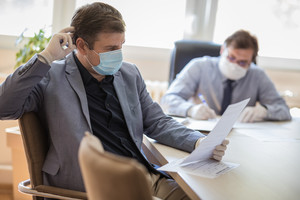
As businesses continue to reopen and more workers return to the workplace despite significant increases in infection rates in some parts of the country, many questions have surfaced about employers’ obligations to provide employees with a safe workplace. The Occupational Safety and Health Administration (OSHA) recently updated its informal COVID-19-related guidance to address a number of emerging employer concerns.
Facemasks
OSHA advises that “employers may choose to ensure that cloth face coverings are worn” at work in order to protect employees. OSHA has not adopted regulations mandating that workers wear, or be provided with, cloth face coverings, and does not view cloth face masks as constituting personal protective equipment (PPE); however, consistent with employers’ pre-COVID-19 duty to provide employees a workplace that is “free from recognized hazards likely to cause death or serious physical harm” – known as the General Duty clause of the Occupational Safety and Health Act – OSHA now recommends that workers “mask up” and that employers support this effort. OSHA notes on this point, “employers may choose to ensure that cloth face coverings are worn as a feasible means of abatement in a control plan designed to address hazards from . . . the virus that causes COVID-19. Employers may choose to use cloth face coverings as a means of source control, such as because of transmission risk that cannot be controlled through engineering or administrative controls, including social distancing.”
Accordingly, employers have the discretion to determine whether to allow employees to wear cloth face coverings in the workplace based on the specific circumstances present at the worksite. If cloth face coverings may become contaminated with chemicals used in the work environment and thus pose a greater risk to employees, or if cloth masks are incompatible with PPE needed to perform a job, employers should consider other alternatives for risk mitigation. Likewise, employers must evaluate requests by employees for reasonable accommodations based on disability or religion. Finally, requirements to mask up at work are not a substitute for physical and social distancing and other engineering and environmental controls aimed at minimizing the spread of the virus.
Notice of Virus Exposure
Many employers have elected to notify employees when they may have been exposed to an employee who is infected with COVID-19. OSHA advises that employers are not required to notify coworkers that a fellow employee has contracted COVID-19. Although OSHA is not responsible for administering the Americans with Disabilities Act (ADA), OSHA notes in its updated guidance that the ADA and other statutes may actually prohibit disclosure of coworkers’ medical information. Employers who do elect to contact trace and provide notice to exposed workers should be mindful of employee privacy concerns and not disclose the name of employees who test positive.
Whistleblowing
Employers anticipate a significant uptick in the number of employees complaining that their employers have failed to provide a safe and healthy work environment and, in turn, alleging that they were disciplined or terminated for raising these concerns. To address this, OSHA reminds that Section 11(c) of the Occupational Safety and Health Act prohibits employers from retaliating against workers for exercising rights under the Act, such as raising health and safety concerns internally with their employers, reporting work-related illnesses, or filing complaints with OSHA. OSHA recommends that employees who believe they have suffered retaliation to submit complaints to OSHA as soon as possible and updated its guidance with directions how to do so, in person, via fax, mail, or email, or online.
OSHA’s updated guidance is advisory only and does not have the force of law, so adherence to these informal recommendations may not be a defense to claims of workplace safety and health issues, but nonetheless these Q&A provide a useful roadmap to employers who struggle to keep up with evolving health and safety guidance during the pandemic.

